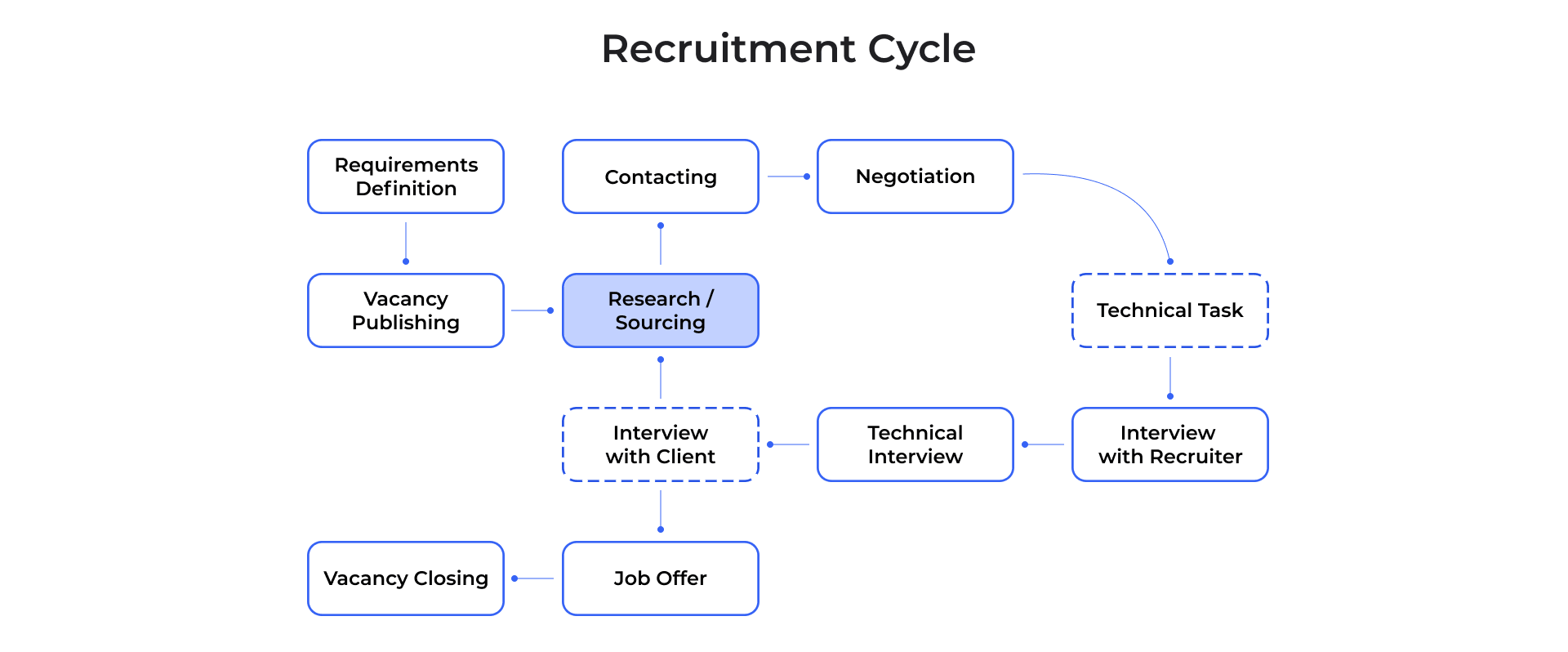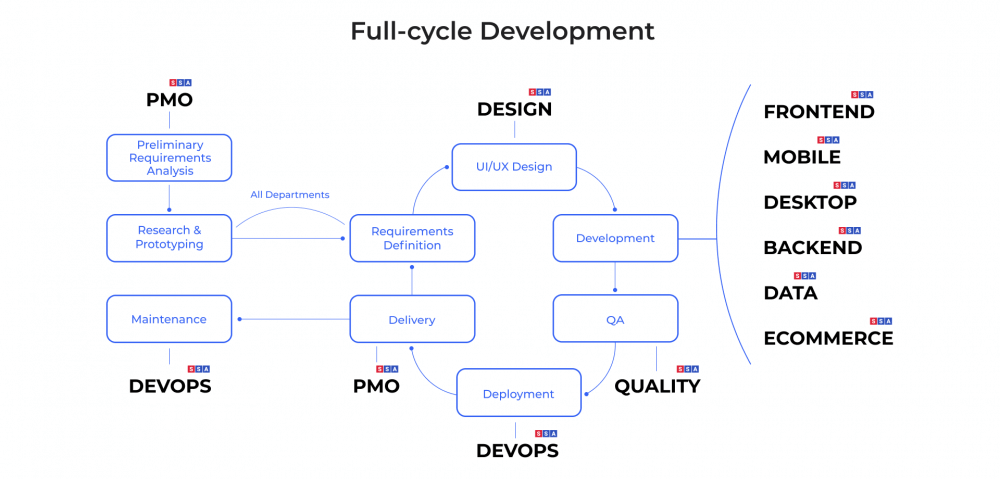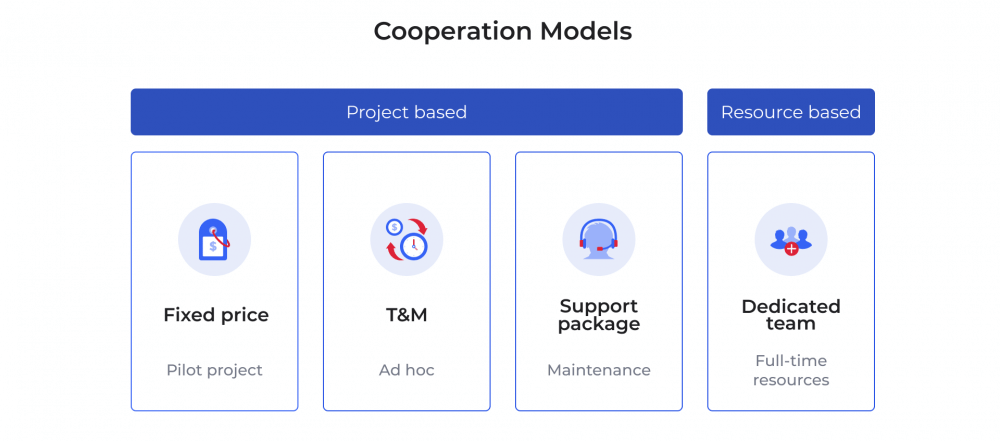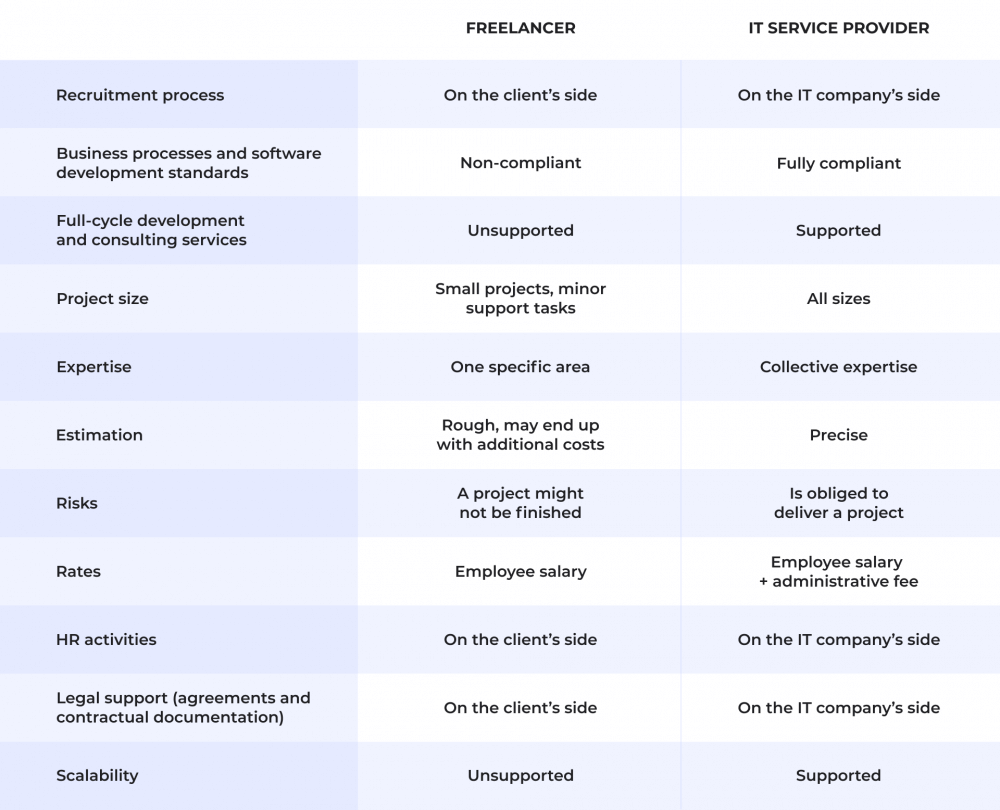What does the future of work look like in a post-pandemic world?
With the outburst of COVID-19, companies now face a complicated decision: let employees work remotely, bring them back to the offices or find a solution in between?
When starting a new or extending an existing project, one of the most important questions is whether to find a freelancer or an IT service provider. This depends on your project size, its complexity, domain focus and more. Ultimately, this decision will influence the success of your project.
As there are pros and cons to each option, let us figure out the best option for your business and help you make the right decision.
Let’s walk through the main factors to consider when choosing between hiring an IT partner and a freelancer.
Talent acquisition requires time and resources, especially if you consider a candidate from another country. To effectively recruit top IT talent, you need to understand the specificity of a local labour market, properly organise a process of searching tech talent and have the strong technical expertise to evaluate a candidate’s knowledge and experience.
There are two options for the business owners: entrust the talent search process to the in-house recruitment team or rely on the IT service provider.
Hiring a freelancer requires the business owner:

On the other hand, the IT service provider can offer candidates within no time if available specialists have the relevant skillset. If there are no relevant specialists in the remote team, the IT company undertakes each step of the talent acquisition process, including internal technical interviews with in-house IT experts.

As a result, the client gets shortlisted candidates with the right skillset and relevant experience for the final interview. If the dedicated developer doesn’t pass the trial period, the IT service provider guarantees to replace the IT consultant as soon as possible.
The IT service provider has established corporate business processes that cover every stage of software development. Following the generally accepted guidelines and software development standards that cover project management, quality assurance and security issues allow IT companies to ensure the final software product quality.
Another essential issue is how to make a remote employee as efficient as an in-house one. It is quite challenging to measure workforce productivity beyond office locations. When a business owner cooperates with a remote independent contractor, he doesn’t have control over the contractor’s schedule and work environment, can’t track his productivity. IT companies can guarantee a high level of employee productivity and have tools for its control.
Security is a crucial issue on every project. IT companies have secure physical offices with access control systems, CCTV, monitoring and alarm systems and so on to eliminate unauthorised access by third parties. Additionally, the client can count on an in-house data centre for development purposes, a secure development environment, licensed and up-to-date corporate software and, high-performance hardware and equipment. If something breaks down, the IT company has the resources to renovate and update it promptly.
In addition, certified partners of Microsoft, Adobe and other technology leaders have access to innovative software products within the partnership programmes. Thus, cooperation with IT service providers allows businesses to get additional benefits for their future products.
If the client needs compliance with HIPAA, GDPR, ISO or, SOCK standards, an IT service provider is the only option. Working from home, freelance software developers can’t adapt to client’s security and compliance requirements.
Furthermore, the IT company pays attention to financial security and provides employee background checks to ensure the client’s project security and intellectual property protection.
The collective experience and knowledge sharing. The primary benefit of working with an IT service provider is the collective experience. The software developer is not an isolated element. They are a part of a project team and particular department. If the specialist faces some new challenge, it is not necessary to solve it alone. It is common to consult with more experienced colleagues, provide code review and, use in-house accelerators and enhancers to speed up the development process. The collaboration with other technical departments and knowledge sharing within internal meetups allow the IT specialist to grow professionally and get valuable technical insights that can be implemented in future projects. The individual freelancer can’t count on any help or advice from outside.
Education and Certifications. The IT company is motivated to invest in its employees’ further education, English proficiency, certification and professional growth. The primary reason is to gain a competitive advantage above other service providers. Companies organise training and courses needed to obtain certifications and compensate financial costs for passing the exams. IT specialists can confirm the level of their knowledge and skills and increase the seniority level through professional certification. On the contrary, a freelancer has no motivation to spend time and costs on training and passing the certification exams.
It is a common practice to conduct regular employee appraisals and develop personal development plans that describe the pattern of professional development for each IT specialist. SSA Group has implemented the matrices of competence to track the professional growth of tech talent and determine an employee’s seniority level.
Full-cycle software development. Big projects from scratch require the deep expertise of more than one IT consultant. Full-cycle software development includes preliminary requirements analysis, research and prototyping, requirements definition, design and development stages, quality assurance, product deployment and post-release support. In summary, it requires the expertise of the project manager, designer, software developers and systems architects, QA and DevOps engineers. It is simpler to form a development team with an IT service provider who already has in-house specialists ready to join each stage of the software development process.
Hiring a freelancer can be a good option for minor development tasks or to become a part of the client’s in-house development team.

Consulting services. A freelancer is always limited by their area of expertise. In contrast, an IT service provider can offer consulting services regarding market research, business analysis, product viability assessment, user experience, user testing, and so forth. Case studies in a specific industry can help determine the maturity of the outsourcing vendor.
It is difficult to build a common culture, generate social cohesion and build shared trust when working remotely. According to the McKinsey research, remote employees experience difficulty connecting to colleagues and managing work-life boundaries, which affects productivity.
The IT service provider cultivates corporate culture by providing team building, anniversary celebrations, corporate events, and other HR activities to establish interpersonal connections within the teams. In addition, IT companies provide a number of employee benefits and compensation such as health insurance plans, office perks, wellness programmes, corporate discounts and so forth.
All these corporate activities contribute to increasing the level of work performance and employee retention. Teams make work more efficient since teammates learn from each other and observe the quality of each other’s work. The innovation and creative process become faster, too. When a team tackles a challenge, the project benefits from multiple perspectives and skillsets.
To deal with the foreign contractors, the client needs to be familiar with the country’s legislative framework, taxation laws and undertake the signing of all the contractual documentation with the freelancer. The IT service provider takes over all the agreements with the client and employees regarding the project, including a non-disclosure agreement.
As business entities, IT companies guarantee legality and reliability. Contracts with clear intellectual property clauses are already available and can be expanded according to the client’s requirements. Moreover, the client can sign a non-disclosure agreement at any stage of the project. IT companies have in-house lawyers and finance departments responsible for taxation and financial reporting of their employees, and dispute resolution if needed. The client doesn’t need to be involved in these issues.
Hiring a freelance software developer can be a cost-effective option. There is no need to pay for office management, health insurance, corporate activities, team building and so on.

IT solution providers offer flexible cooperation models suitable for all kinds of projects depending on project duration and the level of client involvement in the development process. Their rates already include an administrative fee that covers all corporate activities, administrative expenses and employees’ perks in addition to the monthly salary. A comfortable workspace, team building, gifts, and congratulations are part of the corporate culture that helps retain employees and build long-term partnership. As a result, the client receives a motivated team of experts who follows mature business processes and guarantees product delivery.
The primary risk in cooperation with a freelancer is hiring unskilled and unreliable employees who will not finish the project within deadline and budget. Freelance developers lack commitment in most cases and are free to stop cooperation at any project stage.
A good market reputation is crucial for the software development company. Signing an agreement, the IT partner commits to take on the project and get it done. In case of project failure or some issues with IT consultants, a reliable IT service provider agrees to bear risks and offers certain warranties for its clients. Therefore, IT companies pay special attention to IT talent acquisition and checking the candidate’s background and technical competence. In case of problems, the company is fully engaged in resolving them at the legal level.
Before deciding on cooperation with a freelancer or an IT service company, keep your business growth plans in mind. The freelancer does not have the ability and resources to help scale the business in the future. On the other hand, cooperation with IT service providers automatically implies business growth and scalability. At any moment, the client can request increasing the number of experts to accelerate the development process, whether to reduce time to market or launch an additional project.
To summarise the primary pros and cons of each staffing option, we have compiled the following chart.

Involving freelancers or outsourcing partners on projects may become a competitive advantage for businesses. However, the business owner needs to consider the pros and cons of every option carefully before deciding. For small projects or minor support activities with clear specifications, the help of a freelancer can be enough.
On the other hand, if a business owner needs to implement a complex solution from scratch that requires the technical expertise of several IT consultants or request audit services for the existing solution, you may benefit from involving an IT service provider. IT companies have the resources to evaluate the project from different aspects and cover the full cycle of the software development process, gradually involving the relevant IT specialists at each stage.
Thank you for getting to the end of this article. If you have any questions, please, feel free to write to us. We appreciate your feedback and will answer you in the clearest and most precise way. Consider the experienced IT consultants from SSA Group to support your software development plans and business growth.

With the outburst of COVID-19, companies now face a complicated decision: let employees work remotely, bring them back to the offices or find a solution in between?

The reason why so many businesses worldwide benefit from IT outsourcing to Ukraine is a talent pool of tech professionals. Let’s take a look at the Ukrainian IT talent pool.
you're currently offline